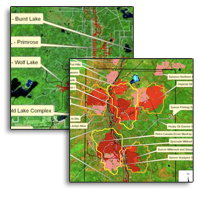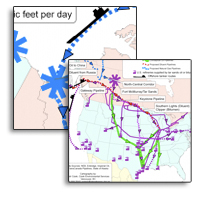Tar Sands 101
The Tar Sands "Gigaproject" is the largest industrial project in human history and likely also the most destructive. The tar sands mining procedure releases at least three times the CO2 emissions as regular oil production and is slated to become the single largest industrial contributor in North America to Climate Change.
The tar sands are already slated to be the cause of up to the second fastest rate of deforestation on the planet behind the Amazon Rainforest Basin. Currently approved projects will see 3 million barrels of tar sands mock crude produced daily by 2018; for each barrel of oil up to as high as five barrels of water are used.
Human health in many communities has seriously taken a turn for the worse with many causes alleged to be from tar sands production. Tar sands production has led to many serious social issues throughout Alberta, from housing crises to the vast expansion of temporary foreign worker programs that racialize and exploit so-called non-citizens. Infrastructure from pipelines to refineries to super tanker oil traffic on the seas crosses the continent in all directions to allthree major oceans and the Gulf of Mexico.
The mock oil produced primarily is consumed in the United States and helps to subsidize continued wars of aggression against other oil producing nations such as Iraq, Venezuela and Iran.
To understand the tar sands in more depth, continue to our Tar Sands 101 reading list
Tar Sands costs driving Shell elsewhere
Oil sands costs driving Shell elsewhere
Company steering exploration dollars to other parts of the world, including the Gulf of Mexico and Kazakhstan
Nathan VanderKlippe
Calgary — Globe and Mail Update Published on Monday, Jan. 25, 2010 8:15PM EST Last updated on Friday, Jan. 29, 2010 4:12AM EST
More than a year after it delayed a decision on a major new oil sands expansion, Royal Dutch Shell PLC (RDS.A-N55.39-1.03-1.83%) is backing further away from Canada's richest crude resource.
Noise limit could kill Mackenzie pipeline, Imperial says
Noise limit could kill Mackenzie pipeline, Imperial says
Jeffrey Jones, National Post
Reuters
January 29, 2010
A panel's recommendation to enforce strict noise limits at a bird
sanctuary has the potential to shut down development of the $16.2-billion
Mackenzie pipeline in Canada's Arctic, the project's backers said.
The contention is among several by Imperial Oil Ltd
and its Mackenzie partners in written responses to proposals made by the
Joint Review Panel, which assessed the massive project's environmental and
socioeconomic impacts in a report issued at the end of last year.
"B.C. eco groups call for 50 per cent land conservation"
This is damning in the extreme. What with the combination of pine beetle, forest fires and more the forests have slunk to somewhere in either the "store" or the emitter categories in BC. These people know this, they have been confronted with the science to debunk the theory that arbitrary protection of a random 50% of the forest can do *anything* ... See moreto alleviate climate change.
Oil and gas grab Prentice's pre-Copenhagen attention
The obvious note-- one of general preference for *any* discussion with corporations over those perceived as being "pro environment" is worthy of note, but as important if not more so is that these same ENGO's *all* are corporate themselves. The Pembina Institute is a known corporate partner of Suncor (among others) and heavy promoter of carbon offsets (and 'producing' of these offsets via so-called green energy such as wind and hydro projects, to then sell to corporations like their partner Suncor who them can greenwash their "business as usual" operations without any changes whatsoever).
Tarsands leave behind ecological dead zone
Tarsands leave behind ecological dead zone
By: Staff Writer (Winnipeg Free Press)
16/01/2010
DEAR EDITOR,
Don Klassen's letter (In defence of oilsands, Jan. 11) gives the impression that the Alberta oilsands are, relative to China and American industrial emissions, an ecologically benign development. This would be true, relative to China and the U.S., only if the sole dimension to the environmental issue of the tarsands involved CO2 emissions, which is not the case.
Outspoken chief was once 'quiet kid'
Outspoken chief was once 'quiet kid'
By Darcy Henton, Edmonton Journal
January 25, 2010
George Poitras looked out the window of his Fort McMurray office and saw opportunity. Outside the restaurant across the street was Premier Ed Stelmach's face beaming at him from the side of a bus.
Shell taps tar sands brakes
Shell taps oilsands brakes
CEO blames high costs for slowed growth
By Shaun Polczer, Calgary Herald
January 26, 2010
D espite signs of a revival in Alberta's oilsands, one of the world's largest oil companies plans to limit growth in the sector in the coming years, its CEO said Monday.
Speaking to the Londonbased Financial Times in his first major interview since he became the company's chief executive in July, Royal Dutch Shell CEO Peter Voser said the company will slow its oilsands expansion plans and shift focus to conventional exploration in other parts of the world.
Arctic gas lines: Adversaries or teammates?
Arctic gas lines: Adversaries or teammates?
Rena Delbridge
Jan 13, 2010
In the decades-long quest to tap Alaska's vast natural gas reserves, it has been easy for residents to forget their state is not the only petroleum province with big pipeline proposals. Alaska's neighbor -- Canada's Northwest Territories -- also has a multibillion-dollar proposal to develop its Arctic gas holdings, and that project has the potential to delay Alaska's pipeline plans.
Enbridge shuts oil pipeline after leak; reroutes supply
Enbridge shuts oil pipeline after leak; reroutes supply
Reuters, Sun Jan 10, 2010
* Oil supplies rerouted after 440,000 bpd Line 2b halted
* Investigating leak in North Dakota after 3,000 bbl spill (Adds background,
details throughout)
NEW YORK, Jan 10 (Reuters) - Enbridge Energy Partners LP shut down
one leg of the main pipeline delivering Canadian crude to the United States
after discovering a leak, but said it was rerouting supplies via other
lines.
Enbridge, which operates crude oil and natural gas transportation systems in
Enbridge Pipeline crews cleaning up oil leak near Neche, N.D.
Enbridge Pipeline crews cleaning up oil leak near Neche, N.D.
UPDATED 10:20 A.M.
Heavy equipment was at the site this morning, skimming soil from the surface to the frost line, according to Pembina County Sheriff Brian Erovick. "it's fairly deep, but it's not that big of any area," he said.
By: Kevin Bonham, Grand Forks Herald
Enbridge pipeline crews are cleaning up a 3,000-barrel crude oil leak near Neche, N.D.
The leak, reported to be about 126,000 gallons of light crude oil, was detected late Friday night by an Enbridge Energy Partners, L.P., control center.



